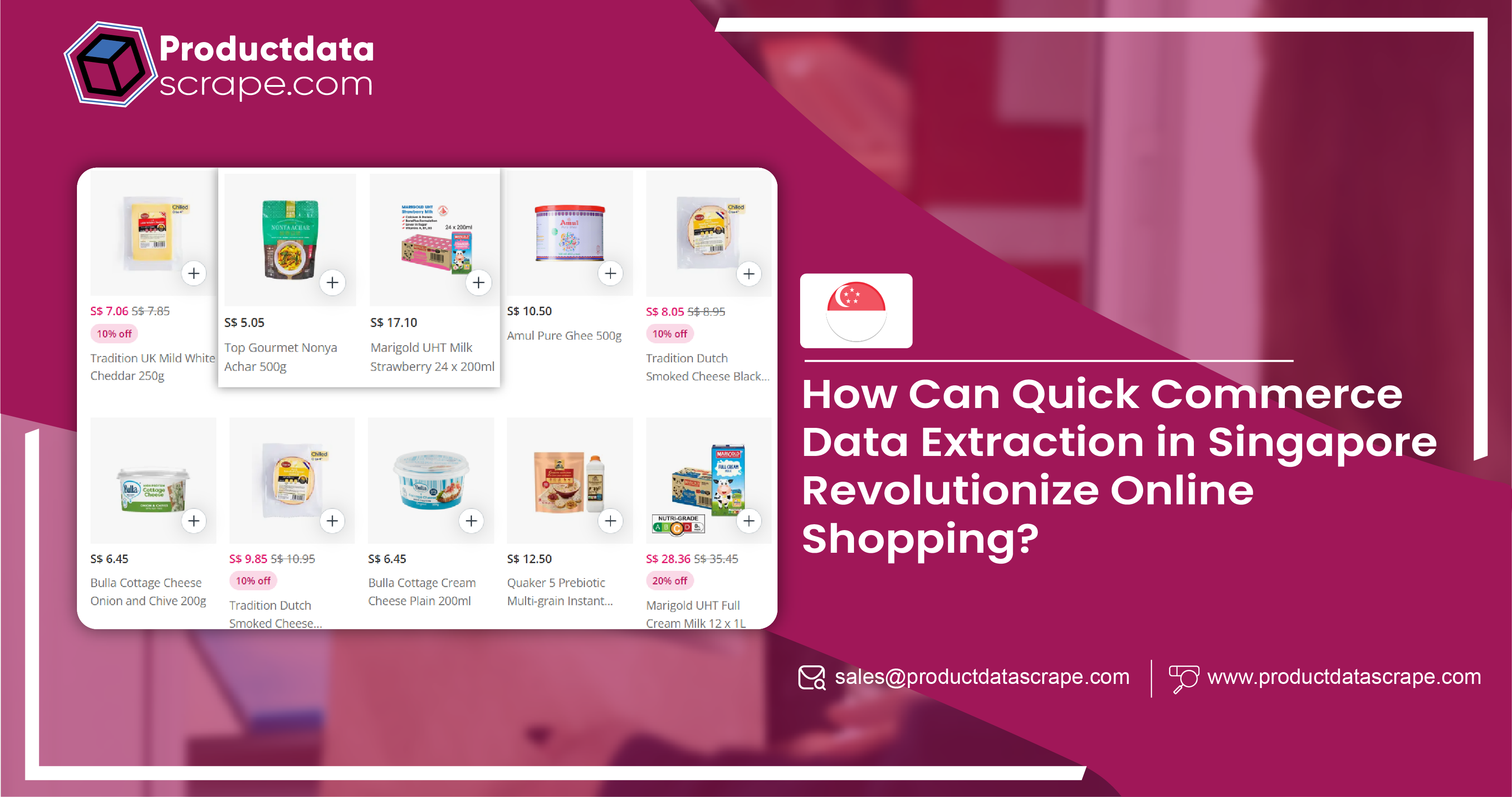
Introduction
Quick commerce (Q-commerce) has transformed the relationship between businesses and
consumers, particularly in the fast-moving consumer goods (FMCG) sector. In Singapore, a
highly connected urban hub, the adoption of Q-commerce has soared, offering rapid product
delivery within an hour or less. This model has become a game-changer for FMCG companies,
enabling them to cater to consumers' convenience and speed demands. Quick Commerce Data
Extraction in Singapore has become crucial for businesses seeking real-time insights into
market trends and consumer preferences as the competition intensifies. By leveraging FMCG
Platforms Data Scraping in Singapore, companies can gather data on product availability,
pricing, promotions, and competitor strategies. This data helps optimize inventory
management, adjust pricing tactics, and track shifting consumer behavior. As a result, data
scraping is a powerful tool for FMCG companies to stay ahead in a rapidly evolving Q-commerce
landscape.
Quick Commerce Data Extraction in Singapore Revolutionizing Online Shopping
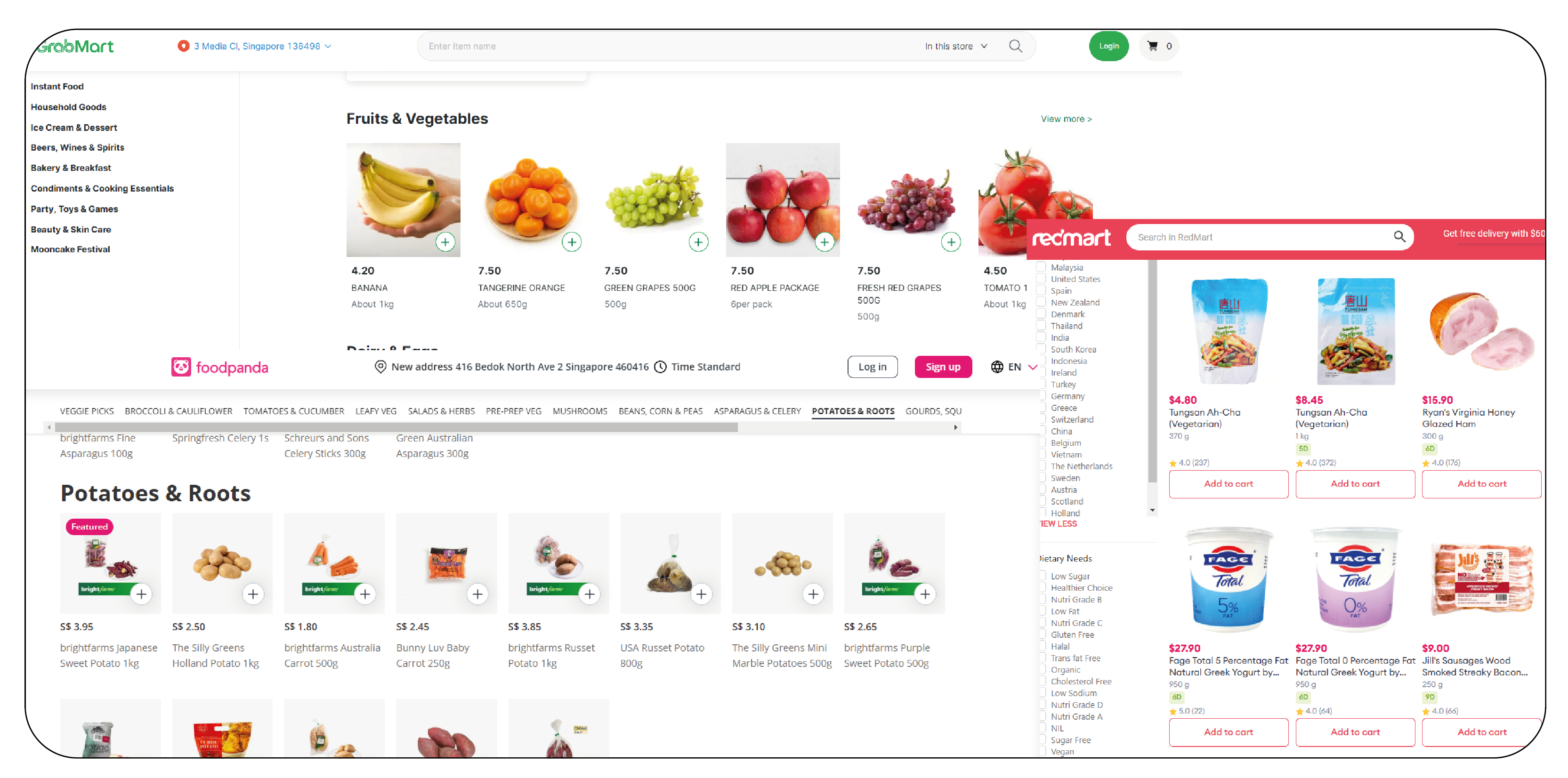
Quick commerce data extraction is rapidly revolutionizing online shopping in Singapore by enabling faster, more efficient operations for e-commerce platforms. By scraping data from various quick commerce services like GrabMart, RedMart, and Pandamart, businesses gain real-time insights into customer behavior, inventory levels, product pricing, and market trends. This data allows companies to optimize inventory management, improve delivery times, and create personalized consumer shopping experiences. For instance, real-time product availability data helps reduce stockouts and enhances customer satisfaction. Additionally, quick commerce data extraction provides valuable insights into competitor pricing, helping businesses adjust their strategies to remain competitive. With the demand for rapid delivery services growing in Singapore, leveraging this data helps streamline operations and maintain customer loyalty. As a result, businesses can make data-driven decisions to enhance product offerings, refine marketing strategies, and ultimately drive growth in the dynamic online retail market.
Leading Quick Commerce Platforms in Singapore
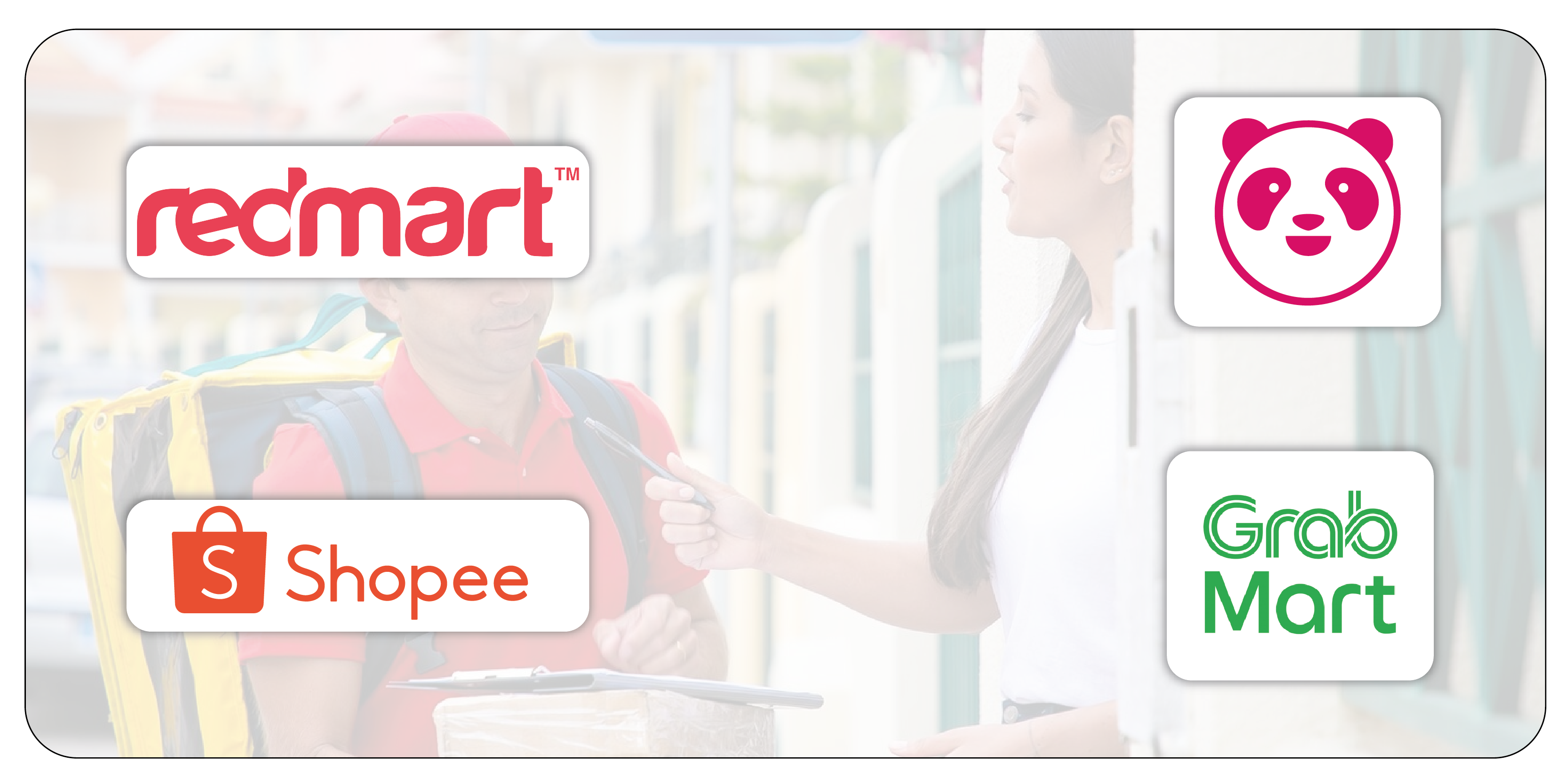
Here are four leading quick commerce platforms in Singapore:
1. GrabMart: GrabMart, part of the Grab app, offers rapid delivery of groceries, essentials, and everyday items. Focusing on convenience, it leverages Grab's extensive delivery network, ensuring fast and reliable service within minutes across the city.
2. RedMart: RedMart, an online grocery platform under Lazada, provides a wide range of products, including fresh groceries and household essentials. It promises fast delivery services with the convenience of ordering from various local and international brands.
3. Shopee Mall: Shopee Mall's quick commerce service enables customers to buy groceries, fashion, electronics, and more with fast delivery options. Leveraging Shopee's vast e-commerce ecosystem, it ensures quick and efficient deliveries to meet the growing demand for instant shopping.
4. Pandamart: Pandamart, powered by Foodpanda, delivers groceries and essentials to customers in Singapore within 30 minutes. It focuses on convenience and a wide selection of products, including fresh produce, snacks, and household items, supporting rapid, on-demand delivery.
What is Q-Commerce, and Why Does It Matter for FMCG?
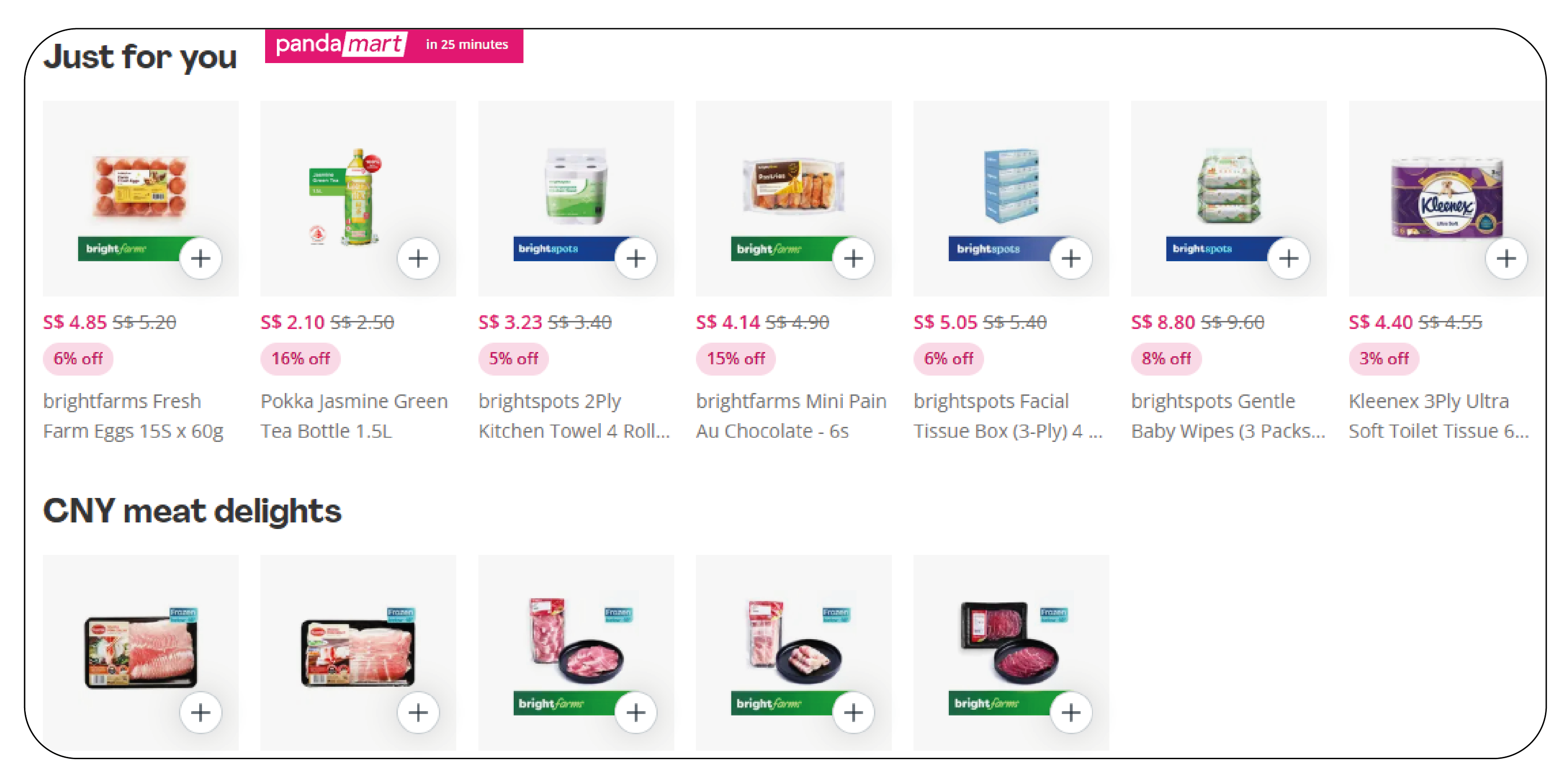
Quick commerce is an e-commerce model focusing on hyperlocal, rapid delivery of products, primarily groceries, household goods, personal care items, and other FMCG products. Unlike traditional e-commerce platforms, which may take days to deliver items, Q-commerce platforms leverage a network of local warehouses, small fulfillment centers, or even dark stores to ensure fast delivery within an hour or less. The primary value proposition for consumers is convenience, as they can order everyday essentials from their smartphones and expect rapid delivery, typically within 30 to 60 minutes.
For FMCG companies, this model offers new opportunities and challenges. The FMCG sector deals with low-cost but high-volume products, meaning inventory turnover is quick. Top FMCG Platforms Data Scraping in Singapore helps businesses monitor trends and ensure quick responses to consumer demands. Price sensitivity, fast-moving trends, and constant consumer demand require businesses to remain agile. Q-commerce addresses these needs by offering an efficient way to manage inventory, improve sales velocity, and cater to consumers' increasingly fast-paced lifestyles.
However, the success of Q-commerce depends on the ability to understand and respond to market demands accurately in real-time. Extract Quick Commerce Data from Asia FMCG Platforms to enable companies to optimize their strategies and stay competitive.
The Role of Data Scraping in the FMCG Sector
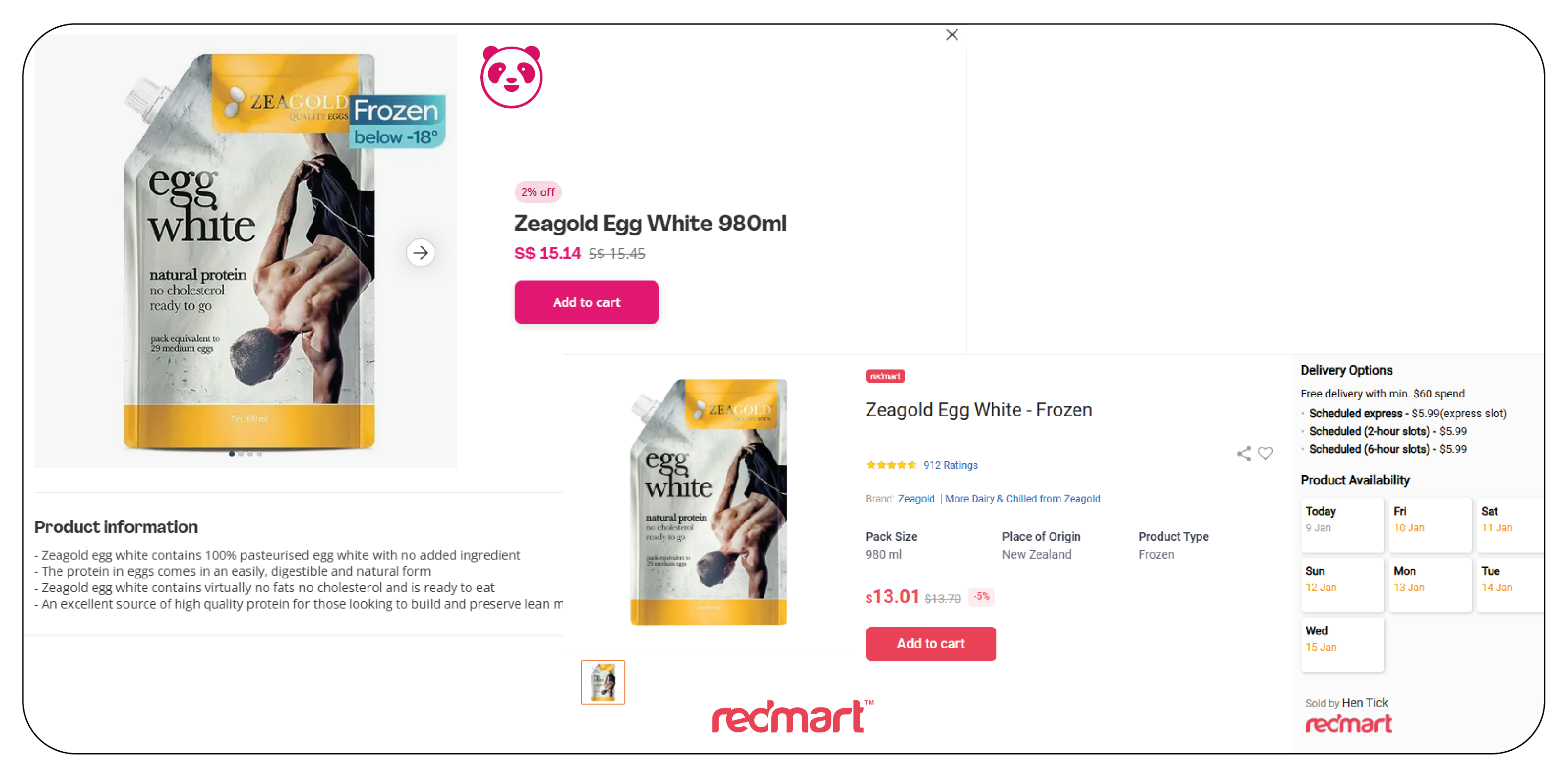
Data scraping is the automated process of extracting data from websites and online platforms. In Q-commerce, data scraping allows businesses to collect information about product availability, pricing trends, consumer preferences, competitors' pricing models, and even promotional activities. By leveraging advanced scraping tools, FMCG companies can gather valuable insights that help them make data-driven decisions, stay competitive, and improve customer engagement.
In Singapore, Web Scraping FMCG and Quick Commerce Data Singapore are essential for businesses aiming to achieve a competitive edge in a fast-moving market. The following are some of the key benefits of scraping FMCG data from these platforms:
1. Competitive Analysis and Market Intelligence: Data scraping enables FMCG companies to gather competitive insights and stay ahead in the market. Businesses can track product offerings, pricing strategies, promotions, and customer sentiment by scraping data from competitor websites, online retailers, and social media. This data helps FMCG companies make informed decisions on product launches, pricing adjustments, and promotional strategies. For instance, scraping data from e-commerce platforms helps brands identify gaps in the market or emerging trends, allowing them to tailor their strategies to meet consumer demand effectively. Furthermore, eCommerce Dataset Scraping provides businesses with structured data for better analysis and decision-making.
2. Consumer Behavior Analysis: Understanding consumer behavior is vital for FMCG businesses to predict demand and optimize product distribution. Data scraping allows companies to extract reviews, ratings, and comments from e-commerce platforms, social media, and forums. FMCG companies can gain insights into consumer preferences, purchasing patterns, and pain points by analyzing this user-generated data. These insights guide product innovation and help FMCG brands create marketing campaigns that resonate with their target audience. Additionally, it assists in tracking shifts in consumer sentiment, enabling brands to stay agile and respond to market dynamics. Web Scraping Quick Commerce Data can refine marketing strategies by offering real-time consumer behavior insights in the fast-moving consumer goods industry.
3. Supply Chain Optimization: Managing a complex supply chain is key to maintaining cost efficiency and product availability in the FMCG sector. Data scraping allows companies to track inventory levels, pricing changes, and availability of raw materials from suppliers. Businesses can make better-informed decisions regarding stock replenishment, production planning, and logistics by gathering real-time data from multiple sources, including supplier websites and wholesale distributors. This ensures that FMCG companies can avoid stockouts, optimize distribution channels, and maintain smooth operations. For instance, Extract Grocery & Gourmet Food Data enables businesses to monitor stock levels and product availability, contributing to better supply chain management.
4. Personalized Marketing and Customer Targeting: Data scraping enables FMCG companies to create highly personalized marketing campaigns by extracting data from consumer profiles, browsing history, and purchase behavior. Scraping social media platforms, for instance, allows brands to identify influencers, monitor brand mentions, and analyze customer sentiment, leading to more targeted advertising. Additionally, by collecting demographic and behavioral data from various online sources, FMCG companies can develop precise customer segmentation strategies and tailor product recommendations or promotions to individual consumer needs. Scraping Grocery & Supermarket Data Scraping Services can help FMCG companies improve targeting through personalized offers and promotions for grocery shoppers.
5. Tracking Industry Trends and Consumer Preferences: The FMCG sector is highly responsive to changing consumer trends, whether the rise of health-conscious products, sustainability demands, or shifts in packaging preferences. Data scraping facilitates the real-time tracking of these trends by collecting information from various sources, including news articles, blogs, reviews, and trend-forecasting platforms. By monitoring industry reports and analyzing relevant data, FMCG businesses can predict upcoming trends and align their product development and marketing strategies accordingly. Staying ahead of trends helps FMCG companies build a strong market presence and capitalize on emerging opportunities. Additionally, Grocery Pricing Data Intelligence helps track pricing trends and consumer demand patterns across various product categories.
6. Regulatory Compliance and Price Monitoring: Compliance with regulations is a significant concern for FMCG businesses, especially regarding product labeling, claims, and pricing. Data scraping helps monitor regulatory changes and pricing practices across markets by extracting and analyzing data from regulatory bodies, competitor websites, and e-commerce platforms. FMCG companies can ensure that their products meet compliance standards, adjust pricing strategies based on competitor movements, and identify real-time price discrepancies. Scraping price data from multiple sources helps companies identify price fluctuations and adapt their pricing strategies to maximize profitability while remaining competitive. For example, Web Scraping Grocery & Gourmet Food Data helps monitor grocery pricing across online platforms, providing valuable insights for pricing decisions.
By leveraging data scraping, FMCG companies can enhance their operational efficiency, make
data-driven decisions, and improve their competitive edge in an increasingly dynamic market.
Conclusion
Scraping FMCG data from leading Q-commerce platforms in Singapore gives businesses a wealth of real-time insights essential for staying competitive in a fast-paced market. By leveraging data scraping to monitor market trends, optimize pricing, track inventory, and understand consumer behavior, FMCG companies can make data-driven decisions that maximize profitability and improve customer satisfaction.
As the Q-commerce industry grows, businesses must adopt innovative strategies and technologies to stay ahead. Data scraping, combined with advanced analytics tools, is a powerful way for FMCG companies to gain a competitive edge, stay agile, and meet the ever-changing demands of consumers in Singapore.
At Product Data Scrape, we strongly emphasize ethical practices across all our services, including Competitor Price Monitoring and Mobile App Data Scraping. Our commitment to transparency and integrity is at the heart of everything we do. With a global presence and a focus on personalized solutions, we aim to exceed client expectations and drive success in data analytics. Our dedication to ethical principles ensures that our operations are both responsible and effective.




































.webp)






